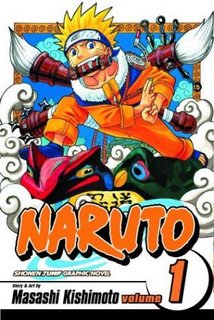Tired, sick, here's the sidebar
Ugh. Couldn't sleep last night. Don't really know why. Let's move on.
Below is the side story that ran alongside the main manga/anime story I posted yesterday. There were also a number of short sidebars, including a timeline and some recommended picks, but I don't think I'll post all that crap unless I hear a huge clamor for it.
No, tomorrow we shall get back to video games. Anyway, here t'is:

It’s easy to assume that the popularity of manga and anime has translated to strong sales for most of the comic book stores in the United States.
An easy assumption, but a wrong one.
Despite its growing popularity, the manga revolution is happening in major bookstores and not in comic shops. This is ironic considering many shops were among the first to nurture an early interest in the medium.
"Today, manga comics and trades sales make up maybe 2 to 3 percent of our overall sales, whereas Marvel and DC comics and trades probably make up about 75 percent," said Bill Wahl, owner of the Comix Connection stores in York and Mechanicsburg.
Ralph Watts, owner of Comics and Paperbacks Plus in Palmyra, concurs.
"Manga just does not sell as well as superheroes do," he said, adding that manga probably accounts for only 10 to 20 percent of his sales.
Convenience could be a reason why that’s so, as it may be easier for most fans to get their latest volume of "Inu Yasha" at Borders in the mall rather than the local comic store.
"Right now there are about 3,000 to 3,500 comic shops in the U.S.," said Comics Journal editor Dirk Deppy. "That equals to about one shop for every 30,000 miles. It’s as if American comic shops don’t count almost."
Competitive pricing, however, is another, perhaps more significant problem. Wahl, an early supporter of anime and manga, discovered quickly how hard it was to contend with Barnes & Noble.
"What we found was that online sellers and then ... the big chain stores, up to and including Target and Wal-Mart, would have retail prices substantially lower than ours, due mostly to their enormous purchasing power," he said.
Deppy, who derided the U.S. comic industry for failing to capitalize on the success of manga in a recent issue of the Journal, said American comics publishers like Marvel cater to such a niche market that they might have alienated folks who would otherwise frequent their local store.
"American comics went into retirement," he said, "catering more and more to hardcore fans. It’s a one-genre medium, and the books have become more arcane."
But if local comic stores aren’t seeing the sort of traffic that the big chains are pulling in, neither Wahl nor Watts is willing to dump manga and anime from their shelves.
"I think that manga has incredible potential for growth, particularly amongst young females," Wahl said. "I think that manga is here to stay and is in its foothold stage. Good stories and characters will keep the fans coming back and create new ones."
"I love having it. It’s good to have a mixture of customers," Watts said. "I still have a lot of faith in manga. There’s so much good stuff."

Copyright The Patriot-News, 2006

0 Comments:
Post a Comment
<< Home